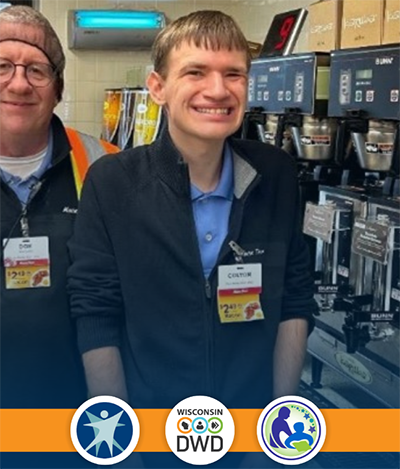Outdated or Unsupported Browser Detected
DWD's website uses the latest technology. This makes our site faster and easier to use across all devices. Unfortunatley, your browser is out of date and is not supported. An update is not required, but it is strongly recommended to improve your browsing experience. To update Internet Explorer to Microsoft Edge visit their website.

For Colton Garvoille, working at Kwik Trip is more than just a job—it’s a step toward independence and confidence.
“I’m proud of my job at Kwik Trip,” said Colton, a retail helper in Verona, Wisconsin. “Working feels good. It’s both fun and challenging.”
In Wisconsin, three state agencies are responsible for preparing students like Colton for success in the workforce. Together, the Department of Health Services (DHS), Department of Public Instruction (DPI), and Department of Workforce Development (DWD) coordinate services that ensure individuals with disabilities have access to competitive integrated employment opportunities.
Competitive integrated employment (CIE) is work in which an individual with a disability is paid no less than the customary rate earned by other employees performing similar work in an environment where they regularly interact with people both with and without disabilities and have access to the same benefits and advancement opportunities as their peers without disabilities.
Colton’s employment journey began at Monona Grove High School, where his transition teacher helped him explore job options and apply for services through DWD’s Division of Vocational Rehabilitation (DVR). One of several transition planning resources available to students with disabilities through DPI, school transition coordinators help young adults and their families prepare for life after high school.
Through his high school’s Beyond Age 18 transition program, Colton gained his first work experience at Taco John’s. Finding a part-time job that fit his abilities and communication needs wasn’t always easy, but he remained eager to learn and contribute.
“My best friend worked at Kwik Trip,” said Colton. “My friend and my mom helped me land a job there.”
With support from DVR, Colton received job coaching services when he started working at Kwik Trip. His job coach helped him learn workplace tasks, navigate the work environment, and build confidence in his role. Today, he continues to receive job coaching services through his Include, Respect, I Self-Direct (IRIS) plan—one of several independent living programs for adults with disabilities managed by DHS.
Best of all, Colton’s IRIS consultant is his former transition teacher. “Her career change has helped maintain consistency with my support during some sad and challenging life changes,” he said.
As a retail helper at Kwik Trip, Colton works 10 hours per week, keeping the store clean and ensuring the coffee and soda stations are stocked. His positive attitude and dedication make him a valued member of the team.
“I ride Metro paratransit to work, which makes me feel independent,” said Colton. “I get a big sense of accomplishment from working.”
Outside of work, Colton enjoys dining at restaurants—especially food trucks and Friday night fish fries. He also loves movies, building complex LEGO kits, and visiting the Wisconsin Dells.
His long-term dream is to work with engines or machinery, but for now, he’s happy in his role at Kwik Trip.
“My support team says that some people have limited ideas about what kinds of jobs people with significant disabilities can do, which is wrong,” said Colton. “I am an example of what is possible! People shouldn’t limit the options if someone doesn’t have the right skill set or behavior.”
Individuals with disabilities who would like to learn more about CIE opportunities can contact DVR toll-free at 800-442-3477, via email at dvr@dwd.wisconsin.gov, or visit Wisconsin Competitive Integrated Employment (CIE): Act 178.
Colton is one of thousands of individuals across Wisconsin who benefit from Competitive Integrated Employment (CIE), a joint effort of DHS, DPI, and DWD-DVR, formalized in 2017 through Wisconsin Act 178.
Special thanks to the Down Syndrome Association of Wisconsin for partnering with Think Ability Wisconsin, Colton, and his family to share his employment story.